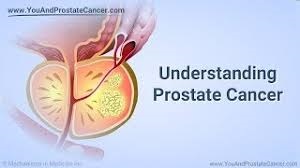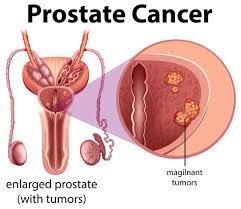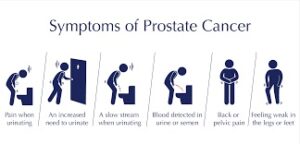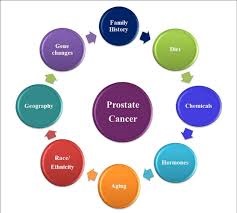UNDERSTANDING PROSTATE CANCER

Prostate cancer is one of the most common cancers affecting men worldwide. Despite its prevalence, understanding this disease can be challenging due to its complex nature and varying symptoms. This comprehensive guide aims to provide clear insights into what prostate cancer is, its common symptoms, the causes behind it, and the key risk factors associated with the disease. By delving into these aspects, we hope to enhance awareness and promote early detection, ultimately aiding in better management and treatment.
WHAT IS PROSTATE CANCER?

Prostate cancer begins in the prostate gland, which is a small, walnut-sized organ located below the bladder and in front of the rectum. The prostate gland is responsible for producing a portion of the seminal fluid that nourishes and transports sperm. Prostate cancer occurs when abnormal cells in the prostate gland start to grow uncontrollably. These cancerous cells can form tumors and potentially spread to other parts of the body if not detected and treated early [1].
COMMON SYMPTOMS OF PROSTATE CANCER

Recognizing the symptoms of prostate cancer is crucial for early detection and treatment. However, it is important to note that some symptoms can be similar to those of other conditions affecting the prostate, such as benign prostatic hyperplasia (BPH). Here are some common symptoms associated with prostate cancer:
1. Frequent Urination
One of the most common symptoms of prostate cancer is an increased need to urinate, particularly at night. This frequent urination can be due to the tumor pressing against the bladder or the urethra, leading to a constant urge to urinate [2].
2. Difficulty Starting or Stopping Urination
Men with prostate cancer may experience difficulty starting urination or have trouble stopping once they have begun. This can be accompanied by a weak or interrupted urine flow, which can be both frustrating and uncomfortable [3].
3. Painful Urination
Pain or a burning sensation during urination can be a sign of prostate cancer. This symptom may indicate that the cancer has caused inflammation or irritation in the prostate gland [4].
4. Blood in Urine or Semen
The presence of blood in the urine (hematuria) or semen (hematospermia) can be alarming and is a potential indicator of prostate cancer. Although this symptom can also be caused by other conditions, it should be evaluated by a healthcare provider [5].
5. Painful Ejaculation
Experiencing pain during ejaculation can be another symptom of prostate cancer. This discomfort may be related to the cancer affecting the prostate or nearby structures [6].
6. Persistent Pain in the Lower Back, Hips, or Pelvis
Prostate cancer that has spread (metastasized) to other parts of the body can cause persistent pain in areas such as the lower back, hips, or pelvis. This type of pain is often deep and dull, and it may not respond to typical pain relief methods [7].
CAUSES OF PROSTATE CANCER

The exact causes of prostate cancer are not fully understood, but several factors are believed to contribute to its development. Researchers have identified various potential causes and mechanisms that may play a role in the onset of this disease.
1. Genetic Mutations:
Genetic mutations are believed to play a significant role in the development of prostate cancer. Certain changes in DNA can lead to the abnormal growth of prostate cells. While some genetic mutations occur spontaneously, others can be inherited from family members [8].
2. Hormonal Factors:
Hormonal changes, particularly involving testosterone and other male hormones, may influence the growth of prostate cancer cells. Testosterone is known to stimulate prostate cell growth, and high levels of this hormone could contribute to cancer development [9].
3. Cellular Changes:
Prostate cancer often begins with changes in the DNA of prostate cells. These changes cause the cells to grow uncontrollably, forming a tumour. The cells can also become more aggressive over time, which can affect how the cancer behaves and spreads [10].
RISK FACTORS FOR PROSTATE CANCER

Understanding the risk factors associated with prostate cancer is essential for identifying those who may be at higher risk and for taking preventive measures. Several factors have been linked to an increased risk of developing prostate cancer:
1. Age:
Age is one of the most significant risk factors for prostate cancer. The risk of developing prostate cancer increases with age, particularly after the age of 50. Most cases of prostate cancer are diagnosed in men over the age of 65 [11].
2. Family History:
A family history of prostate cancer can increase an individual’s risk of developing the disease. Men with close relatives, such as a father or brother, who have had prostate cancer are more likely to develop it themselves. Genetic predispositions and inherited mutations can play a role in this increased risk [12].
3. Ethnicity:
Ethnicity also influences prostate cancer risk. Research indicates that African American men have a higher risk of developing prostate cancer compared to men of other ethnic groups. They are also more likely to be diagnosed at a younger age and with more aggressive forms of the disease [13].
4. Diet and Lifestyle:
Diet and lifestyle factors can impact prostate cancer risk. Some studies suggest that diets high in red meat and low in fruits and vegetables may be associated with an increased risk of prostate cancer [14]. Additionally, obesity and a sedentary lifestyle are considered potential risk factors for developing prostate cancer [15].
5. Certain Medical Conditions:
Certain medical conditions can also influence prostate cancer risk. For example, men with a history of prostatitis (inflammation of the prostate) may have an increased risk of developing prostate cancer. Additionally, conditions like benign prostatic hyperplasia (BPH) may contribute to an elevated risk [16].
PROMOTING AWARENESS AND EARLY DETECTION

Promoting awareness of prostate cancer and encouraging early detection are crucial steps in improving outcomes and reducing mortality associated with this disease. Regular screenings and consultations with healthcare providers can lead to early diagnosis and more effective treatment.
1. Regular Screenings:
Regular screenings, such as the prostate-specific antigen (PSA) test and digital rectal exam (DRE), are important for detecting prostate cancer early. The PSA test measures the level of PSA in the blood, which can be elevated in men with prostate cancer. The DRE involves a physical examination of the prostate to check for abnormalities [17].
2. Education and Awareness:
Educating the public about prostate cancer symptoms, risk factors, and the importance of early detection can help increase awareness and encourage more men to seek medical advice. Public health campaigns and informational resources play a key role in spreading knowledge and promoting proactive health measures [18].
3. Consulting Healthcare Providers
Men should consult their healthcare providers to discuss their risk factors and determine an appropriate screening plan. Healthcare providers can offer personalized advice based on age, family history, and other relevant factors [19].
CONCLUSION.
Understanding prostate cancer involves recognizing its symptoms, causes, and risk factors. By being aware of these aspects, individuals can take proactive steps towards early detection and effective management of the disease. Regular screenings, education, and consulting with healthcare providers are essential for promoting awareness and improving outcomes.
Prostate cancer remains a significant health concern, but with increased knowledge and proactive measures, it is possible to manage and mitigate the risks associated with this disease. Through continued research and public awareness efforts, we can work towards better prevention, early detection, and treatment of prostate cancer.
REFERENCES:
- American Cancer Society. (2023). What Is Prostate Cancer?. Retrieved from American Cancer Society
- Mayo Clinic. (2023). Prostate Cancer Symptoms. Retrieved from Mayo Clinic
- National Cancer Institute. (2022). Signs and Symptoms of Prostate Cancer. Retrieved from National Cancer Institute
- Cleveland Clinic. (2023). Symptoms of Prostate Cancer. Retrieved from Cleveland Clinic
- Cancer Research UK. (2023). Blood in Urine and Semen. Retrieved from Cancer Research UK
- American Urological Association. (2023). Painful Ejaculation and Prostate Cancer. Retrieved from AUA
- Prostate Cancer Foundation. (2023). Pain from Advanced Prostate Cancer. Retrieved from Prostate Cancer Foundation
- National Comprehensive Cancer Network. (2023). Genetic Factors in Prostate Cancer. Retrieved from NCCN
- The Lancet Oncology. (2023). Hormonal Factors and Prostate Cancer. Retrieved from The Lancet Oncology
- American Cancer Society. (2023). Cellular Changes in Prostate Cancer. Retrieved from American Cancer Society
- Mayo Clinic. (2023). Age and Prostate Cancer Risk. Retrieved from Mayo Clinic
- National Cancer Institute. (2023). Family History and Prostate Cancer Risk. Retrieved from National Cancer Institute
- Cancer Research UK. (2023). Ethnicity and Prostate Cancer Risk. Retrieved from Cancer Research UK
- American Institute for Cancer Research. (2023). Diet and Prostate Cancer Risk. Retrieved from AICR
- National Institute on Aging. (2023). Obesity and Prostate Cancer Risk. Retrieved from NIA
- Urology Care Foundation. (2023). Medical Conditions and Prostate Cancer Risk. Retrieved from Urology Care Foundation
- American Urological Association. (2023). Prostate Cancer Screening. Retrieved from AUA
- Prostate Cancer Foundation. (2023). Awareness and Education for Prostate Cancer. Retrieved from Prostate Cancer Foundation
- National Health Service. (2023). Consulting Healthcare Providers for Prostate Cancer. Retrieved from NHS